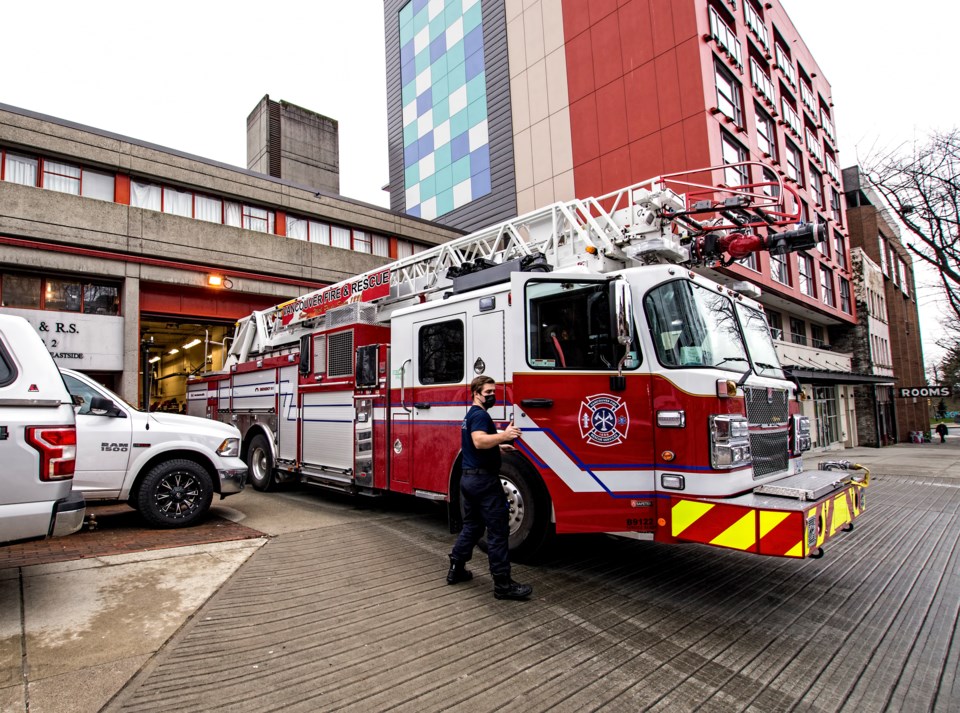A B.C. Supreme Court judge has awarded a Vancouver fire captain injured in a bridge motor vehicle accident more than $1.5 million.
A May 5 judgment from Justice William Veenstra said John Mantei was southbound on his way home in July 2015 when he encountered an accident blocking his way south on the Alex Fraser Bridge.
The scene caused him to stop.
“After a couple of seconds, his vehicle was rear-ended by a vehicle that had not seen the road blockage ahead and was travelling at full highway speed,” Veenstra said.
The judge said defendant Rafatullah Afzali had admitted liability for the accident.
Veenstra noted that Mantei had suffered numerous injuries in the past but continued to rise in the Vancouver Fire and Rescue Services after taking company officer training courses.
The judge heard from former service colleagues.
“His operational skills were very strong, as he was able to coordinate even larger crews at larger fires,” Veenstra said. “He balanced being an aggressive firefighter with a high commitment to safety. At the fire hall, he was known as a jokester with a good sense of humour.”
His goal was to become a battalion chief and then apply for an assistant chief position.
Veenstra said Mantei’s evidence at trial was that he remembered being on the other side of the accident scene, parked on the side of the road and wondering what had happened.
“While there is a gap in his memory, he does not specifically remember losing consciousness,” Veenstra said.
He was taken to the hospital but did not remember the ambulance ride.
He was assessed as having soft tissue injuries but later reported multiple ongoing symptoms, including poor sleep, headaches, difficulty with problem-solving and moments of anxiety.
By October 2015, his doctor noted post-concussion syndrome, with symptoms including difficulty with concentration, a short fuse, forgetfulness and poor sleep.
An avid soccer player, Mantei had been a soccer coach but soon began to experience difficulty doing that.
He returned to work in January 2016.
“However, he found it more challenging to track all of the different teams at a complex fire scene,” Veenstra said. He had previously found this very easy to do, keeping it all in his head, but he now had to write things down.
He soon began taking sick days, and his doctor found further issues, some with a knee.
Senior management began to question his time off.
Then, in August 2019, Mantei underwent total knee replacement surgery and received multiple forms of counselling in the following months.
Continuing a modified workweek, in March, he saw a counsellor who noted concerns about stress, anxiety, nightmares, and “grief and sense of loss of self and of the work invested over his career for job advancement/promotion,’” Veenstra said.
He retired in May 2020 at age 54 with 33 years and five months of pensionable service.
“Other than the improvement to his right knee, arising from the . . . surgery, Mr. Mantei’s evidence is that his physical symptoms have not improved and that his psychological issues have actually worsened since the (accident),” Veenstra said.
At trial, Veenstra said, Afzali argued that Mantei downplayed the contribution of a pre-existing knee condition to the symptoms he exhibited in the years after the accident. He said Mantei also downplayed the underlying psychological issues arising from his many years of trauma as a firefighter.
Veenstra disagreed.
“I accept Mr. Mantei’s evidence as to his physical condition and the activities he participated in during the time period leading up to the (accident). I also accept his evidence that he was not suffering from PTSD symptoms of any significance prior to the MVA. I also accept his evidence that he began to experience significant knee pain shortly after the MVA,” the judge said. “I also accept that his plan, prior to the MVA, was to work to age 59, and that his goal was to do so at the assistant chief level.”
The bulk of the award is $1.02 million for loss of future earning capacity, with $280,000 awarded for future care.

